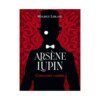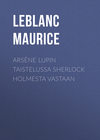Kitabı oku: «Arsène Lupin versus Herlock Sholmes», sayfa 2
Bir şeyler ters gitti, lütfen daha sonra tekrar deneyin
Türler ve etiketler
Yaş sınırı:
12+Litres'teki yayın tarihi:
09 mart 2017Hacim:
220 s. 1 illüstrasyonTercüman:
Telif hakkı:
Public Domain









